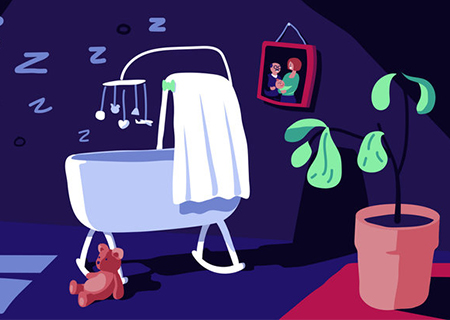The 5 classic sleep traps and how to avoid them

Does the ticking clock fill you with dread as it creeps closer to bedtime for your baby? Do you steel yourself every night as you put your child in their crib, only to have them wail the cry of an abandoned baby? You’re not suffering alone through this nightly drama. When exhausted new parents are faced with poor sleeping habits in their child, it is always a relentless struggle. A word to the wise, there is no such thing as a bad sleeper, sleeping habits are just subjective depending on a host of external factors. Here’s 5 classic sleep traps that make bedtime a nightmare for new parents, and how to avoid them.
Trap 1: Feeding or rocking your baby to sleep
Newborn need to feed every 2-3 hours, making their (and ultimately your) sleep-wake cycles extremely chaotic. Since feeding and rocking your baby are pretty much all you’re doing those first few months, it’s easy to fall into this trap. This is okay till about the age of 4 months, as your baby doesn’t have any self soothing strategies. But after that, they mature neurologically and learn to develop sleep routines. Create a specific bedtime routine that your baby can associate with sleep. Give him a bath, read him a story, put on his pajamas, dim the lights, and once you baby is drowsy, put him in his crib. Let your baby associate falling asleep with being in his crib and not in your arms.
Trap 2: Picking up and soothing your baby at every cry
As a parent, your instinct will be to comfort every whimper, and for the first 6 months this is required. It builds a feeling of safety and trust, and strengthens your bond with your baby. However, once your child is older, give him the opportunity to self soothe. Older babies are quick to realise that tears can be used to their advantage, and will put up a fuss to get their way. That’s when you run through your mental checklist- Is my baby hungry? Thirsty? Wet? Sick? If all seems fine and he’s only crying because you’ve left his side, set a timer for 5 minutes and leave the room. If he’s still crying after 5 minutes, soothe him, reset the timer and leave again. Do this until your baby falls asleep, and the next night set the timer to 10 minute intervals.
Trap 3: Extended night feed
Just like a passenger on a cruise ship, your baby will get accustomed to his luxury midnight buffet well past the point of actually requiring the calories. In those first few months, you baby gets conditioned to suck in order to fall back asleep. Sure it might seem easier to just give in instead of suffering through the sobs, but when you oblige past the age of 6 months, you only contribute to building a disrupted sleep schedule, and possibly affect the following day-time eating. Nip this vicious cycle in the bud, and close that kitchen come bedtime. This will help your baby eat better in the day as well.
Trap 4: Napping on the go
Every grandparent will tell you the cautionary tale of the baby that would only sleep in motion. Not only does catching a nap on the go affect scheduled naptimes, but it also doesn’t help associate sleep with the allotted sleep cot. It’s important for a baby to understand and differentiate between rest time, wake time and feed time. The schedule also helps you transition back to your regular life and responsibilities.
Trap 5. Stay up later and sleep longer
Waiting for your baby to naturally feel sleepy and then putting him to bed, assuming he would fall asleep faster and sleep longer, is a classic trap. Babies aren’t capable of identifying sleep as a solution to tired, and barrel right into the territory of overtired and cranky. An easy hack here is to convert the early evening nap to bedtime, by rolling it forward by 15 minutes everyday till you reach a suitable time.

